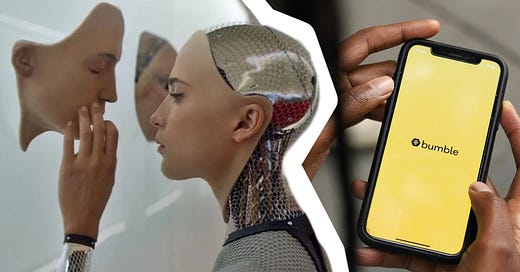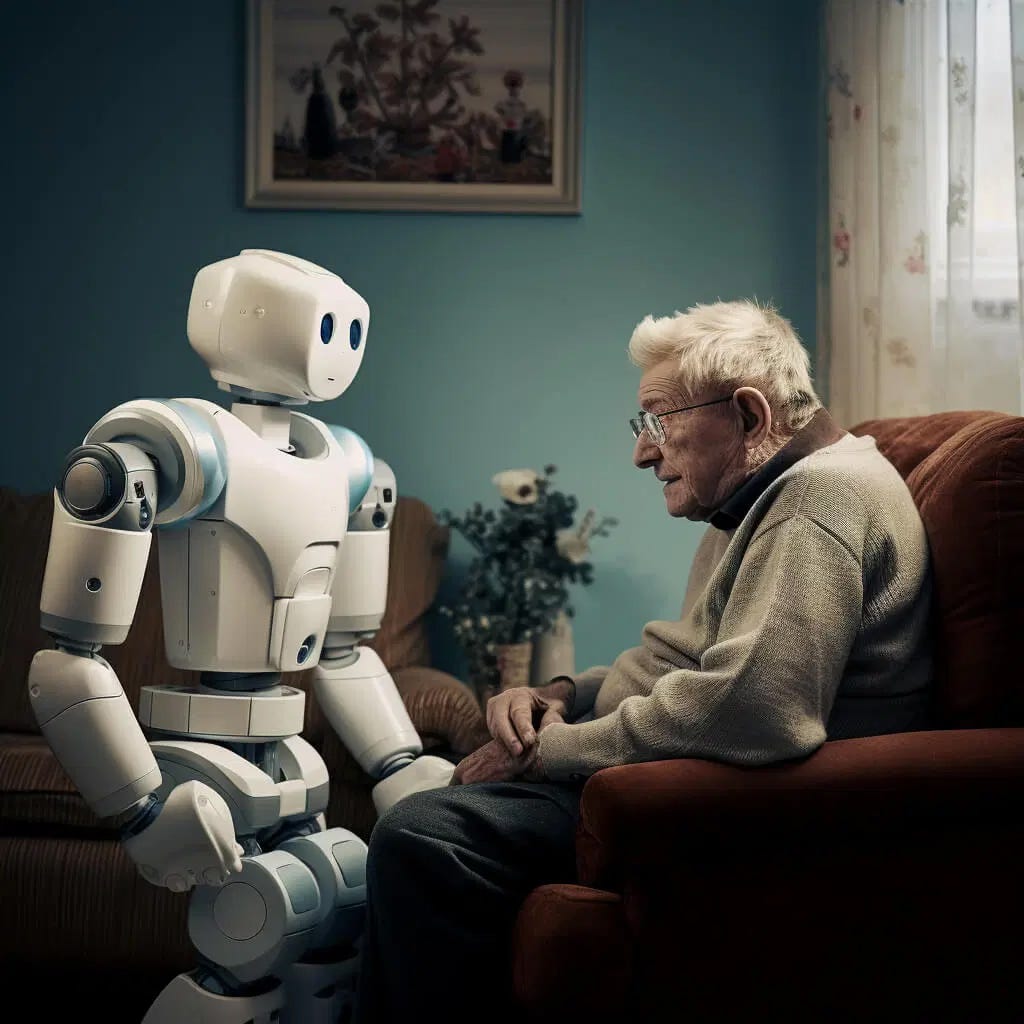Technology won’t solve our loneliness epidemic
Dating apps, AI clones & companionship bots. Unsurprisingly, we still feel alone...
I was at university during the advent of Tinder. I remember quite clearly sitting at either end of our ugly brown sofa with my friend Hebe, carefully choosing pictures for our profiles. It was a complete novelty, instantly having access to boys. Cringy boys, handsome boys, boys we knew. We kicked our feet and shrieked with laughter every time we got a mundane “Hello,” or “You alright?” But the reality was less exciting. The dates I went on were mostly short-lived and disappointing. They turned up half a foot shorter than promised, acting as though it would be rude of me to notice. They talked endlessly about sex positions or the gym though I didn’t ask. That sort of thing.
But, back then, the idea of finding love through an app was such an uncommon concept that a disappointing Tinder date was like water off a duck’s back. At my university, near-constant socialising was the norm. From the day I lugged my suitcase over the threshold of my first student home, I was rarely alone, forever walking into my friend Jack’s room across the hall, or else skulking off to Hebe’s dorm when a flicker of loneliness presented itself. Online dating was not, in short, where I got my social fix.
Fast forward ten years, and things are very different. Newly single again at the end of last year, I tentatively re-downloaded Hinge. Quite quickly, I was sent a message by a man named Russell. “Can you please help me,” he wrote, “I don’t get any replies on here and it’s really getting me down. No one even has the time to say thanks but no thanks. Please help me.” Initially, I scoffed at the brazenness of his method. Maybe stop guilt-tripping strangers and you’ll have more luck, I thought icily. I promptly deleted Hinge, deciding that, actually, I wasn’t ready to plunge into the thoroughly changed modern dating scene. But it did help me to understand something better: gone are the days of swiping for the fun of it. People are desperate for a cure for their loneliness.
The dating PR crisis
In the UK, loneliness is considered one of the largest public health challenges we face. Interestingly, loneliness is currently highest for those aged 16-24 years old, the age bracket I was in when I was at university, and probably at my least lonely. It’s also the age bracket that spends the most amount of time online—a clear differentiator. Social media was alive and well when I was in my early twenties, but it was inelegant and literally social. We didn’t follow influencers, we followed our friends. And if I ever managed to tally up six hours of screentime in one day, it would be the result of some terrible hangover, not a nondescript Tuesday. It’s not a stretch to assume, then, that there’s a direct link between being online and tech-savvy, and being lonely.
In parallel to this, dating apps are having a PR crisis. Even the apps themselves seem all too aware of how we feel about them, with Bumble’s Christmas ad pronouncing “All you want for Christmas is not to be asked about your dating life.” People are tired of the poor engagement, the blows to self-esteem, the ghosting and general bad behaviour. But, rather than taking a step back, we seem to be wading further into the technological waters in order to find a better solution.
AI clones are the latest tech trend here to cure our loneliness, apparently. An additional feature within certain dating apps, according to Artificial Intelligence +, these clones “interact with users in a way that closely mimics the actual person they represent. Algorithms analyze behavioural data from multiple sources like texts, emails, and social media posts, processing language patterns to tailor conversation styles that fit the individual’s personality.” Users are essentially handing the conversational reins over to AI in the hopes that it will do a better job at securing love on their behalf.
Wading further still, and we have the invention of companion robots, AI-powered bots that aim to solve the loneliness epidemic by holding conversations with users, sometimes emulating the voices of their real-life loved ones.
I don’t know about you, but something about the latter feels desperately sad to me. Even if the stats prove that such inventions do help with symptoms of loneliness or social isolation, it still feels as though we are pouring the majority of our efforts into the wrong cup, continuing to create Smart Solutions for a problem that is jumping up and down at us, waving and screaming as we look straight through it. The necessity of human-to-human interaction.
This isn’t to say that one cannot exist in the same world as the other. FaceTiming a family member using a smartphone is a perfectly useful way to use technology to access real conversation—and is surely a more lasting, pleasurable interaction than chatting with a robot that has learned their manner of speech. But technology, robotics and AI alone won’t save us.
I find it hard to see a future where AI can cure the deep core of our loneliness. It may give us a dopamine hit, or a simulation of compassion, friendship or love, but we are not yet so evolved as to not know the difference.
The link between romance and loneliness
De-centering romance has been a major talking point in 2024, especially among women. While I don’t think this is as relevant in elderly loneliness, I do think our imbibed, hetero storytelling around romantic love is a significant cause for loneliness in young people. We cling to the idea that romantic love will solve our loneliness, despite all the evidence to the contrary (yes, a whopping 31% of middle-aged married people still feel lonely). And not only do we believe that romantic love will cure loneliness, but we believe technology is the best way to find it. A recipe for failure, in my opinion, and an easy way to spiral further into feelings of isolation, panic, and even depression.
Similarly, in alt-right, hyper-online circles, the male loneliness epidemic is often blamed on women and girls. The onus is on them to be with young men romantically—to help lift them out of loneliness. Rarely do these men blame each other - or themselves - for their predicament. Of course, it is always easier to blame a scapegoat for our own feelings of inadequacy or ignorance. You can see how some men - in the pits of social isolation and despair - might find it mollifying to imagine that women and girls are a hateful, shallow, belittling bunch, rather than admit that they themselves find it hard to connect with them as individuals. Or, that happiness might be more easily found outside of sexual or romantic gratification altogether i.e. friendships, therapy, or platonic intimacy.
Two birds, one stone
Currently, my dating life is about as interesting as a blank Word doc. But I’m not lonely. I chat with my parents in their kitchen, I go to parkrun and laugh with other women about how freezing it is, I see my friends at the weekends and go for long, chatty walks. I know how these small social interactions add up to feelings of contentment, even though they might feel insignificant in isolation.
It’s also a sad truth that the more assured we feel in our platonic relationships, the better we come across to prospective partners. There’s a reason why, when choosing aforementioned pictures for our online dating profiles, we want to include one that shows I’ve got friends. Even though I have a lot of empathy for men like Russell, immediately begging me to relieve you of your loneliness is not a compelling invitation. As humans, we’re far more inclined to be with someone who is at ease with their social life, not someone who needs rescuing from it.
Too often, we neglect the idea that focusing on family, friendships and hobbies makes us more attractive. But it does. And, not only that, it stops us from feeling as lonely, too. It’s such a simple, timeless solution that you can see why people are more inclined to trust AI clones and companionship robots. We equate cleverness with problem-solving, technology with the future. What is a brief conversation with a barista or passer-by by comparison? Well, actually, I’d argue everything.
Perhaps there will be a future where loneliness is wiped out by technology. But as long as I can so clearly remember a time before such ideas even existed, I think it’s safe to assume we’re nowhere close. And, by that logic, if we’re suffering with loneliness, the most effective cure remains simple: to step back into the real world.
For more writing, poetry and pics, follow me on Instagram. And for any poetry fans, I also run The Line Break, a weekly poem delivered to your inbox every Monday morning.








Such a great post! I've been rethinking my approach to socialization recently and in the end nothing beats just spending time with people in person (friends, colleagues at work, people in clubs and hobbies). I think technology can be a great way to connect with others but the way it's built right now just gamifies shallow interactions (likes, views, followers). I miss the time when I used MySpace and Facebook to connect with friends and we had no influencers on there at all :).
This is fabulous! One of the reasons why I love being a hospital doctor is the daily opportunity to be around real people, solving real problems in this ever-simulated world. Don’t get me wrong, this has its challenges too, but I wouldn’t change it for the world.